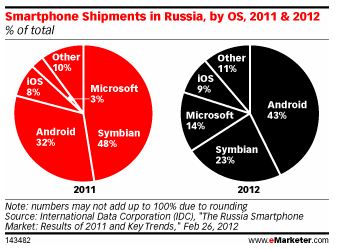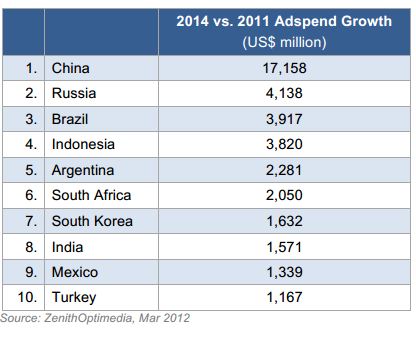Yesterday, rumours spread quickly that Yandex Maps will be integrated into Apple’s own mapping service on iOS6 (Bloomberg, TechCrunch, SearchEngineLand).
TechCrunch’s Ingrid Lunden gives a good description of how this integration will play out:
“When users are looking for details on Apple’s Maps service, Yandex’s geosearch API powers that that search, providing information about restaurants, shops, streets, and so on. If a user wants more detail on a place, there is a Yandex button at the bottom of the listing; clicking through takes the user to the Yandex.Map app — Yandex’s standalone native mapping app. If a user doesn’t have that app installed, they are redirected to the App Store to download it.”
This is indicative of a strategy where Apple teams up with local players to improve areas where its maps app is still lacking.
Rumours also will that this is in fact part of a much bigger deal which would make Yandex the default search engine on Apple’s mobile version of Safari. That would be a major leap forward for Yandex should this be the case. Surely, it would be a massive boost to its international aspirations. However, until then, it’s interesting to look at the extent to which Yandex is likely to benefit from the integration of its maps service into iOS6.
No matter how you look at it, this is good news for Yandex. First of all, this is a stamp of approval from none other than Apple, which represents huge branding value for Yandex going forward. Secondly, Yandex’s gain is the loss of its biggest rival, Google.
While Yandex has maintained a healthy lead in Russia (it holds 60% of the search market), Google has actually gained on the home-grown darling in recent years (currently claiming around 22% of the market). However, through this deal it has been suggested that Yandex will be able to keep Google at bay in Russia. For obvious reasons it strengthens Yandex’s chances of doing so, but smartphone shipments to Russia over the past year indicate that Google might not be all that dependent on traffic from iOS devices.
According to eMarketer, Google’s Android OS has grown an astonishing 11 percentage points since 2011 and is rapidly on its way to account for half of all smartphone shipments to the country. Meanwhile, Apple’s iOS has remained near flat.
In the burgeoning tablet market, StatCounter figures (although perhaps not the most reliable) suggest that Russia is in fact one of those places where Android is doing relatively well, claiming 22% of the market compared to iOS’ 77%. By comparison, Apple’s iPad sits on more than 90% of the tablet market in many affluent countries. However, Apple still holds an enviable position with more than three quarters of the Russian tablet market, but bear in mind that competition is heating up as a growing number of Android-based tablet devices enter the market.
Competition only likely to intensify
I’ve noticed several blog comments lately from people stating that Google doesn’t take Russia seriously. To that I can only say I’m afraid everything points to the contrary. The Mountain View-based company has been pouring money into Russia to kick Yandex off the throne, though without much luck so far. And with Russia projected to be the country with the world’s second highest adspend growth between 2011-2014, it would be more than surprising to see Google’s continuing attempts to conquer the lucrative Russian market go on a declining trend. As mentioned before, the iOS6 integration is indeed positive news for Yandex, but whether it will move the needle much in its favour is yet to be seen.
Preston Carey, US Business Development Director for Yandex, will be speaking at the International Search Summit in New York on October 1st, where he will deliver key insights into how you get it right in Russia. See the full line-up & book your spot here.









